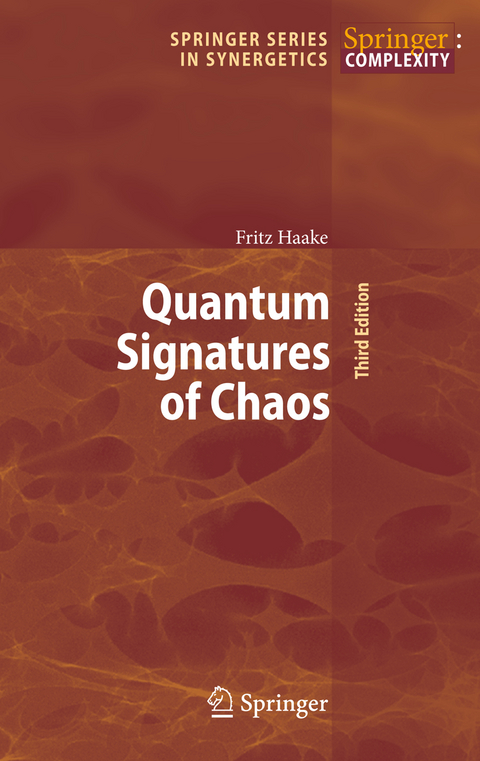
Quantum Signatures of Chaos
Springer Berlin (Verlag)
9783642263309 (ISBN)
Nine years have passed since I dispatched the second edition, and the book still appears to be in demand. The time may be ripe for an update. As the perhaps most conspicable extension, I describe the understanding of u- versal spectral ?uctuations recently reached on the basis of periodic-orbit theory. To make the presentation of those semiclassical developments selfcontained, I decided to to underpin them by a new short chapter on classical Hamiltonian mechanics. Inasmuch as the semiclassical theory not only draws inspiration from the nonlinear sigma model but actually aims at constructing that model in terms of periodic orbits, it appeared indicated to make small additions to the previous treatment within the chapter on superanalysis. Less voluminous but as close to my heart are additions to the chapter on level dynamics which close previous gaps in that approach to spectral universality. It was a pleasant duty to pay my respect to collegues in our Transregio- Sonderforschungsbereich, Martin Zirnbauer, Alex Altland, Alan Huckleberry, and Peter Heinzner, by including a short account of their beautiful work on nonstandard symmetry classes. The chapter on random matrices has not been expanded in proportion to the development of the ?eld but now includes an up-to-date treatment of an old topic in algebra, Newton's relations, to provide a background to the Riemann-Siegel loo- like of semiclassical periodic-orbit theory.
Time Reversal and Unitary Symmetries.- Level Repulsion.- Random-Matrix Theory.- Level Clustering.- Level Dynamics.- Quantum Localization.- Dissipative Systems.- Classical Hamiltonian Chaos.- Semiclassical Roles for Classical Orbits.- Superanalysis for Random-Matrix Theory.
From the reviews of the third edition:
"The book can be recommended both as a textbook and a review of the subject. The rich set of references allows one to catch up with the current literature. Exercises facilitate the study and will be of use to the lecturer. It can be a base of a solid graduate theoretical course in quantum chaos." (Pure and Applied Geophysics, 160, 2003)
"In summary, this is definitely an essential reference book for the specialist. It will also ably serve someone entering the field for the first time who needs to learn the theoretical state of the art in detail." (G. Summy (University of Oxford), Contemporary Physics 2002, vol. 43, page 232)
"This book is about aspects of quantum chaos, with emphasis on energy-level statistics ... and their relation to random matrix theory, including a self-contained introduction to the supersymmetric technique, as well as semiclassical periodic-orbit expansions. ... Each chapter ends with a list of problems and references, which is helpful to the specialist and the beginner as well." (César R. de Oliveira, Mathematical Reviews, Issue 2011 d)
"This book is phenomenal and brings many topics Quantum Chaos who were treated in a sovereign manner by Fritz Haake. Thus I recommend this book for anyone who is interested in the study of the distribution of eigenvalues of generic operators, especially those related to quantum problems. It is an essential book for any researcher in Quantum Chaos, sometimes this book is known as the Quantum Chaos 'bible'." (Philosophy, Religion and Science Book Reviews, September, 2012)
"This by now classic text ... witnesses both the rapid growth of a new field of 'quantum chaology' and its subsequent maturity period plus further developments. ... Each chapter is accompanied by a selection of problems which both test and deepen the reader understanding of the material presented. The text is both an introduction and asurvey of the field of quantum chaos. References to original research papers direct the reader to more advanced discussion of topics that were outlined in the present text." (Piotr Garbaczewski, Zentralblatt MATH, Vol. 1209, 2011)
| Erscheint lt. Verlag | 28.6.2012 |
|---|---|
| Reihe/Serie | Springer Series in Synergetics |
| Zusatzinfo | XXIV, 576 p. 1 illus. in color. |
| Verlagsort | Berlin |
| Sprache | englisch |
| Maße | 155 x 235 mm |
| Gewicht | 884 g |
| Themenwelt | Mathematik / Informatik ► Informatik ► Theorie / Studium |
| Naturwissenschaften ► Physik / Astronomie ► Quantenphysik | |
| Naturwissenschaften ► Physik / Astronomie ► Theoretische Physik | |
| Naturwissenschaften ► Physik / Astronomie ► Thermodynamik | |
| Schlagworte | Chaos • classical Hamiltonian chaos • Clustering • Dissipative Systems • level dynamics • linear optimization • matrix theory • Mechanics • Quantenphysik • Quantum Chaos • quantum localization • quantum mechanics • quantum time evolution • random matrices • universal spectral fluctuations |
| ISBN-13 | 9783642263309 / 9783642263309 |
| Zustand | Neuware |
| Informationen gemäß Produktsicherheitsverordnung (GPSR) | |
| Haben Sie eine Frage zum Produkt? |
aus dem Bereich


